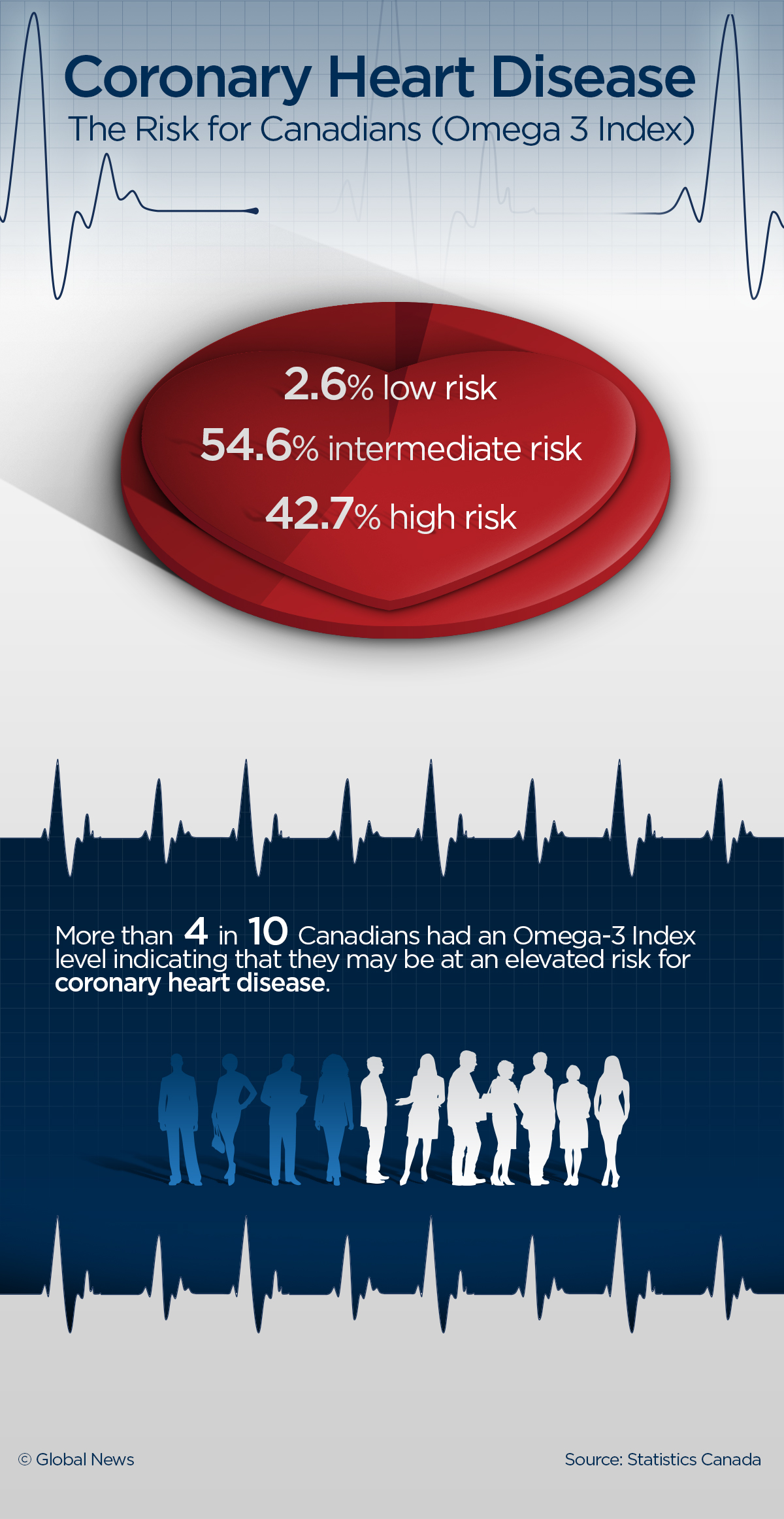Omega-3’s are considered a heart healthy fat that can reduce the risk of heart disease. A new report by Statistics Canada says close to 40 per cent of Canadians are not getting enough Omega-3’s, and not meeting the recommended requirement is putting Canadians at an increased risk for heart disease.

In a first, the Canadian Health Measures Survey measured the Omega-3 index, a blood measurement, according to the study author’s “the Omega-3 index is considered to be a good indicator of the potential risk for coronary heart disease mortality.” The index measured fatty acids in fish oil found in red blood cells, including EPA (eicosapentaenoic acid) and DHA (docosahexaenoic acid) according to the survey.
READ MORE: 3 simple foods to keep your heart healthy
The survey showed 42.7 per cent of Canadians were at high risk, 54.6 per cent were at intermediate risk and only 2.6 per cent of the population was considered at low risk for coronary heart disease.
Omega-3’s are found in fatty fish such as salmon, trout, bluefish, herring, mackerel, and sardines.
So how should Canadians be getting their Omega-3’s and how much is recommended? We asked the Heart and Stroke Foundation to break down the study and offer some advice.
HEART AND STROKE FOUNDATION BREAKS IT DOWN
The study itself?
- This study is interesting in that it looks at the Omega-3 index (a blood measurement) among Canadians – for the first time. This is only one measure in a whole spectrum of factors that can provide information about health and cardiovascular disease risk.
- It is a survey which provides information ─ it is not designed to show a cause an effect.
- The publication doesn’t provide details on the total risk profile of individuals (for example, we don’t know their activity levels or their fruit and vegetable consumption). It does provide details on obesity and smoking – both which are risk factors for CVD (heart disease and stroke).
- More than half of individuals in this study were obese or overweight (putting them at risk of high blood pressure, diabetes, high blood cholesterol, heart disease and stroke).
What does this study mean for Canadians?
- B.C. to ban drug use in all public places in major overhaul of decriminalization
- 3 women diagnosed with HIV after ‘vampire facials’ at unlicensed U.S. spa
- Solar eclipse eye damage: More than 160 cases reported in Ontario, Quebec
- ‘Super lice’ are becoming more resistant to chemical shampoos. What to use instead
- This study reminds us that our behaviours – including what we eat – affects our risk of cardiovascular disease.
- There are many factors that can increase the risk of developing heart disease or stroke.
- The healthy behaviours to reduce the risk of heart attack and stroke include eating a healthy diet, being physically active, being smoke-free, limiting alcohol consumption, maintaining a healthy weight and reducing stress. It is also important to manage one’s blood pressure and cholesterol levels, as well as diabetes.
What are Omega-3s?
- Omega-3 fatty acids are a type of polyunsaturated fat which is a healthy fat choice.
Research has focused on the three main types of omega-3 fatty acids:
- Docosahexaenoic acid (DHA)
- Eicosapentaenoic acid (EPA)
- Alpha-linolenic acid (ALA)
Omega-3 fatty acids (particularly DHA and EPA) can help to reduce the risk of heart disease and stroke by:
- Reducing your blood triglyceride levels (a type of blood fat)
- Preventing your blood from sticking and clotting
- Reducing your risk of developing abnormal heart rhythms
- Reducing your heart rate
The omega-3 fatty acids DHA and EPA are found predominantly in fatty fish such as trout, bluefish, herring, mackerel, salmon, and sardines.
What is the association between Omega 3s and heart disease?
- Omega-3 fatty acids can help reduce the risk of heart disease. Fish, such as char, herring, mackerel, rainbow trout, salmon, and sardines have high amounts of omega-3 fats that can contribute to heart health. Omega-3 fatty acids are a type of polyunsaturated fat which may help prevent clotting of blood, reduce the risk of stroke and also help to lower triglycerides, a type of blood fat linked to heart disease. Omega-3 fatty acids may also play a role in reducing the risk of arrhythmias.
- Eating fish is part of a healthy diet and can help reduce the risk of heart disease and stroke. In addition to eating a healthy diet to prevent heart disease, individuals should be tobacco-free and engage in 150 minutes per week of moderate- to vigorous-intensity physical activity. In addition, knowing and controlling risk factors including high blood pressure, diabetes and high blood cholesterol; limiting alcohol consumption and reducing stress can also help reduce the risk of heart disease and stroke.
What are the Foundation’s recommendations on Omega 3s?
- The Heart and Stroke Foundation recommends Canadians consume at least two servings of fish a week as part of a healthy diet. For those who can’t get enough fish in their diet, the Heart and Stroke Foundation recommends Canadians speak to their healthcare provider about the potential risks and benefits of fish oil and omega-3 supplements.
- The Heart and Stroke Foundation reminds Canadians who have suffered cardiovascular disease or stroke to speak to their healthcare provider about potential risks and benefits of medications or supplements. Omega-3 supplements have side effects and may interact with medications.
Are supplements or fish oils equally effective as eating fish in alleviating the possibility of heart disease?
- Increasing omega-3 fatty acids from foods is preferable. Eating a healthy balanced diet according to Canada’s Food Guide that includes foods from the four food groups, can help reduce the risk of heart disease and stroke.





Comments